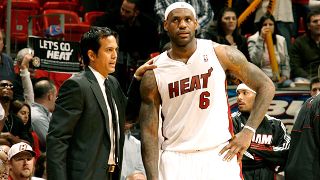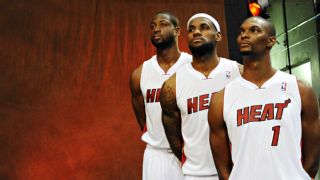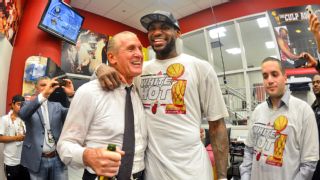|
Miami Heat president Pat Riley is notoriously selective in terms of media availability and has said very little regarding the very public departure of LeBron James from Miami in 2014 as a free agent. But in author Ian Thomsen's new book, "The Soul of Basketball: The Epic Showdown between LeBron, Kobe, Doc and Dirk that Saved the NBA," the normally reticent Riley opens up with a number of scintillating details regarding his relationship with James -- including suggesting that in the infancy of LeBron's tenure with the Heat, LeBron nudged Riley toward descending from the front office to replace coach Erik Spoelstra. During a loss to Dallas on Nov. 27, 2010, LeBron's first season in Miami, a video clip of LeBron bumping Spoelstra as he strode toward the huddle during a timeout went viral. The team had lost four of five games at that point, dropping its record to 9-8, and held a long, private meeting following the game. ESPN, citing unnamed sources, reported a few days later that players were frustrated with Spoelstra and were "questioning whether he is the right coach for their team.'' "The Soul of Basketball" takes us one step further. Riley revealed in the book that the day after the Heat's loss to Dallas, he asked James, Dwyane Wade and Chris Bosh to meet him in his office for 10 minutes to check on how the team leaders felt the young season was progressing. "They just said, 'We're not feeling it,' or something like that," Riley told Thomsen. "We talked about the typical things that we have to do, have patience and all of that stuff. "And I remember LeBron looking at me, and he said, 'Don't you ever get the itch?' I said, 'The itch for what?' He said, 'The itch to coach again?' I said, 'No, I don't have the itch.' He didn't ask any more questions, and I didn't offer any more answers. But I know what it meant, and I always go back and wonder about what he was thinking at that time. He walked out scratching his leg like it was itching." Riley said to Thomsen that similar questions were raised during the team's July 2010 free-agent recruiting pitch to LeBron. "They wanted to know what was going to happen with Erik," Riley said. "They wondered if I was going to be coaching. I said, 'Look, Erik is the head coach, that's it. I support him. I'm not interested in coaching.'  "The thought was in their mind at times that maybe I would come back and coach, I think. But I was truly done, I didn't want to get back into it, and Erik is a hell of a coach. He was coming off two good playoff years, but he had not been coaching three superstars. And then with the whole LeBron effect, it would have been a tough transition for any head coach with two years of experience." During that same recruiting meeting, Riley said in the book, he tried to prepare LeBron and his advisers for the negative fallout that would erupt following his decision to leave Cleveland. Riley says he even used the word "fear" in discussing that scenario. "And both of them, Maverick [Carter] and LeBron, looked at me,'' Riley recalled. "Like, 'Fear? Afraid of what?' They almost mocked me. This was a big decision. I was trying to tell them, 'S--- [is] going to hit the fan, man.' 'Afraid? Us?' They had so much confidence in what they were doing, and they were so smart in a lot of ways." Following LeBron's declaration on live television that he would be "taking my talents to South Beach,'' a public relations debacle dubbed The Decision, Riley recounted meeting a shaken James on the tarmac in Miami. "That night at three in the morning we met him at the airport," Riley told Thomsen. "He had two private charters come in, and I brought a lot of people down, family and everything. They got off the plane, and I remember walking right up to LeBron. He was worn-out. He was just worn-out. He almost had tears in his eyes." By then LeBron and his camp were aware of the response by Cavaliers owner Dan Gilbert, who had publicly savaged LeBron. "It really stung hard with them," Riley said. "LeBron just gave me a big hug and he slumped. And I just remember how heavy this was for all of them. It wasn't like they were smiling and happy to be in Miami. They had just broken the chain of his life in Akron, and it took tremendous guts to do that. I hear it from players all the time: 'I'm a grown-ass man, treat me as such.' Well, he made a grown-ass decision by doing that." Criticism of James was further fueled by a Miami "welcome rally" the following day at the team's arena featuring cheerleaders, a brass band, plumes of white smoke, and LeBron inciting the capacity crowd by promising them "not two, not three, not four, not five, not six not seven [championships] ...''  Riley asserted he was shocked by the spectacle, claiming he and his staff were too busy concentrating on negotiating sign-and-trade deals to acquire James and Bosh, and negotiating contracts for them and Wade, to monitor the details of the celebration. "I knew there was going to be something, but I didn't envision that," Riley said. "It was my fault. It's all on me." Riley said the three stars signed their six-year contracts while dressed in the Heat uniforms that they would wear to a public celebration of their arrival minutes later. "I said to Micky [Arison, the Heat owner], 'Let's go down and enjoy this press conference,'" Riley recalled. "When I got there, I couldn't believe there were eighteen thousand people in the arena. "It threw gasoline on the fire. It did ring of some hubris on our part that was not planned." Just as LeBron had been surprised by the backlash of The Decision, Thomsen wrote, so too would Riley be stunned the next day. "I just think the euphoria of that moment and what all three of them had done had got to them," Riley said. "The serotonin level was going high. Some of the things that were said, I think they would take it back and be a little more humble if they could, and probably the same for us as an organization. But once it got going I was not going up on the stage to throw them off. "How would that have been? I would have been booed out of the arena by eighteen thousand people." Riley admitted to Thomsen he was angry when, in 2014, LeBron bolted from Miami to return to Cleveland as a free agent. "I had two to three days of tremendous anger. I was absolutely livid, which I expressed to myself and my closest friends," Riley said. Then, Thomsen wrote, over the weeks and months to come, Riley came to see the move to Cleveland from LeBron's point of view. "My beautiful plan all of a sudden came crashing down," Riley said. "That team in ten years could have won five or six championships. But I get it. I get the whole chronicle of [LeBron's] life. "While there may have been some carnage always left behind when he made these kinds of moves, in Cleveland and also in Miami, he did the right thing. I just finally came to accept the realization that he and his family said, 'You'll never, ever be accepted back in your hometown if you don't go back to try to win a title. Otherwise someday you'll go back there and have the scarlet letter on your back. You'll be the greatest player in the history of mankind, but back there, nobody's really going to accept you.'" Riley told Thomsen that after James left, he had no contact with him until the 2016 NBA Finals, when Cleveland played the Golden State Warriors in Game 7. Riley said it was then he finally reached out. "I didn't want to send him anything that he could read before he hit the floor," Riley said. "As soon as he hit the floor, I sent a text to him. I said, 'Win this and be free.' "He never got back to me with a response. In fact, he said something after the game.'' After LeBron won his championship for Cleveland, he told ESPN's Dave McMenamin: "When I decided to leave Miami -- I'm not going to name any names, I can't do that -- but there were some people that I trusted and built relationships with in those four years [who] told me I was making the biggest mistake of my career. And that s--- hurt me. And I know it was an emotional time that they told me that because I was leaving. They just told me it was the biggest mistake I was making in my career. And that right there was my motivation." "It wasn't me," Riley told Thomsen. "I never said anything to him. "That's one of LeBron's greatest traits, that somewhere in him there's such a competitive thing that he's going to find something to motivate himself to win." When asked on Monday where his relationship stands with Riley now LeBron said, "Um, we can talk about that later." Sources told ESPN that James and Riley have not spoken to each other since James returned to Cleveland in 2014. James, according to a source familiar with his thinking, would be interested in thawing that icy relationship, but believes that Riley has no interest in doing so. "That's just how Riles is," said the source. "He's old school. You're either with him or against him." "The Soul of Basketball" will be released on April 17. ESPN's Dave McMenamin contributed to this story.
|


